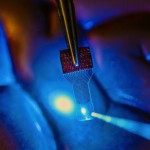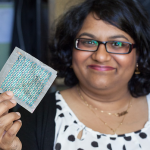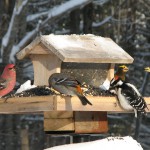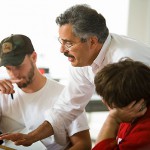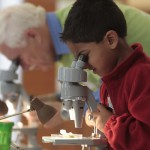Campus news Latest News
103 years of tradition lives on for UW–Madison’s Homecoming
The game day opponent may be a first-timer, but this year’s University of Wisconsin–Madison Homecoming tradition is 103 years in the making. Thousands of alumni will return this week for the annual commemoration of Homecoming at UW–Madison, when UW graduates join future alumni and the campus community for a weeklong celebration of spirited Badger traditions.
Professor honored for green chemistry research
University of Wisconsin–Madison chemistry professor Shannon Stahl is one of five scientists nationwide to receive a Presidential Green Chemistry Challenge Award from the U.S. Environmental Protection Agency (EPA) in recognition of his research on using oxygen from the air in chemical reactions.
See-through sensors open new window into the brain
Developing invisible implantable medical sensor arrays, a team of University of Wisconsin–Madison engineers has overcome a major technological hurdle in researchers’ efforts to understand the brain. The team described its technology, which has applications in fields ranging from neuroscience to cardiac care and even contact lenses, in the Oct. 20 issue of the online journal Nature Communications.
Recent sightings: Autumnal activity
A pedestrian walks by a chalked sidewalk advertisement for the 2014 Madison Heart Walk during an autumn day. The charity event, sponsored by…
UW physicist receives American Ingenuity Award for IceCube effort
Francis Halzen, the University of Wisconsin–Madison physicist who was the driving force behind the giant neutrino telescope known as IceCube at the South Pole, has been named a winner of the 2014 American Ingenuity Award.
UW-Madison chemist named Packard Fellow
Trisha Andrew, a University of Wisconsin–Madison assistant professor of chemistry, is one of 18 early career scientists from around the country named a Packard Fellow for Science and Engineering. The award includes a grant of $875,000 over five years to pursue research and is given in recognition of the potential significance of scholarship and innovation from the nation’s most promising young scientists and engineers.
Climate change alters cast of winter birds
Over the past two decades, the resident communities of birds that attend eastern North America’s backyard bird feeders in winter have quietly been remade, most likely as a result of a warming climate. Writing this week in the journal Global Change Biology, University of Wisconsin–Madison wildlife biologists Benjamin Zuckerberg and Karine Princé document that once rare wintering bird species are now commonplace in the American Northeast.
Newsmaker who called out Microsoft president to speak at UW–Madison
Last week, when Microsoft CEO Satya Nadella told women in tech fields to wait to be rewarded rather than ask for raises, he was quietly but forcefully challenged by his interviewer, Maria Klawe. The next day, facing a storm of criticism, Nadella backpedaled, saying by email, “Maria’s advice was the right advice. If you think you deserve a raise, you should just ask.” Klawe, president of Harvey Mudd College will speak Friday at Union South about increasing women’s participation in science and technology careers on the University of Wisconsin–Madison campus.
To practice mindfulness, start by counting your breaths
It's as simple as breathing in and breathing out.
Media Advisory: Newsmaker who called out Microsoft CEO to speak Friday
Maria Klawe, president of Harvey Mudd College in Claremont, California, will discuss ways to increase women's participation in science and technology careers on Friday, Oct. 17.
Media Advisory: Coverage opportunities at Wisconsin Science Festival
This tip sheet highlights key events of the 2014 Wisconsin Science Festival, held Oct. 16-19, and opportunities for coverage. All events below will be in the Discovery Building at 330 N. Orchard St.
Highlights start early in four-day Wisconsin Science Festival
You name it, and the fourth annual Wisconsin Science Festival has it all — dance, star-gazing, fossils, art, museum and stage shows — spread over four days and venues in 25 Wisconsin cities. While the curious of all ages are immersed in hands-on exploration, and visitors marvel at the research underway and specimens on display around campus and the state, several of the festival’s marquee events may be of interest to faculty and staff on campus. The festival runs from Thursday through Sunday, Oct. 16-19.
Media Advisory: Great Lakes commits $7.2 million to support UW–Madison initiatives to increase number of STEM graduates nationwide
On Tuesday, Oct. 14 at 1:30 p.m., University of Wisconsin–Madison Provost Sarah Mangelsdorf and Great Lakes Higher Education Corporation President and CEO Richard D. George will announce a major commitment to support initiatives aimed at increasing the number of students who graduate in science, technology, engineering and mathematics (STEM) majors and pursue professions in these fields.


